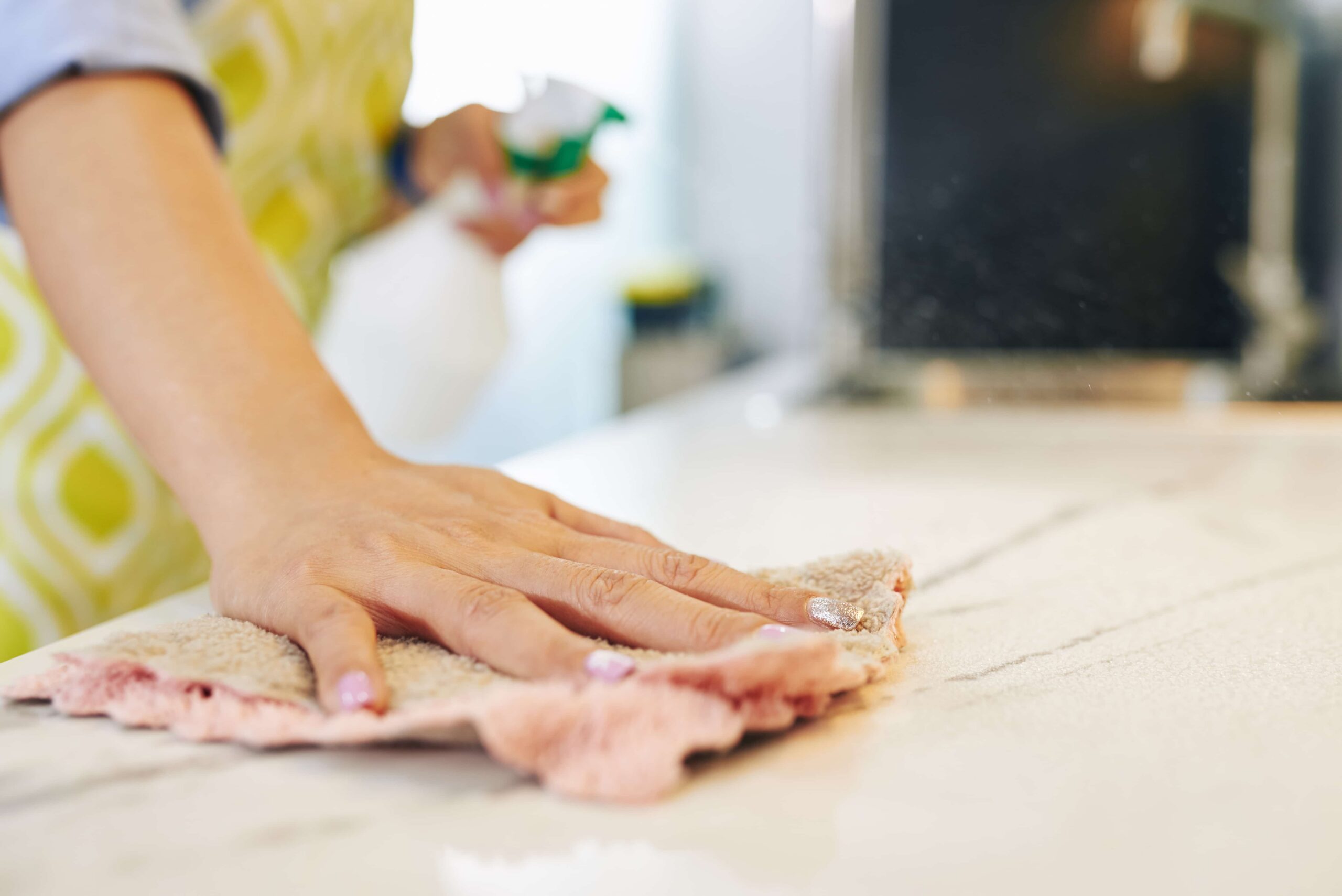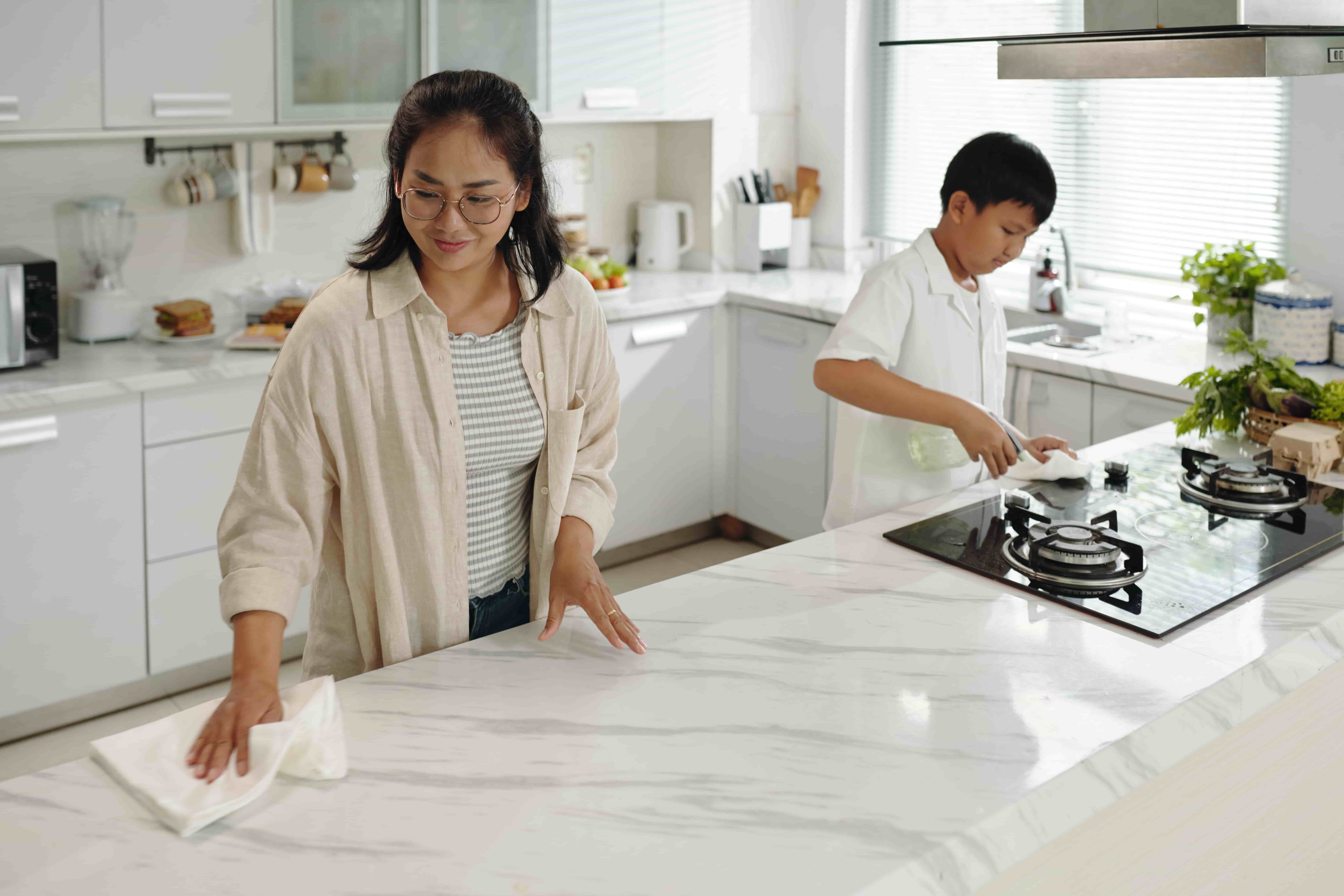Why Proper Countertop Maintenance Matters
Your kitchen countertop isn’t just a workspace—it’s a centrepiece that combines design and functionality. Regular upkeep keeps it visually appealing and ensures durability over time. In Singapore, where the humid climate can intensify wear and tear, proper care for granite, sintered stone, and quartz is crucial.
Granite Countertops: Timeless Beauty with Specific Needs
Granite as a Material
Granite is a classic choice for kitchens, valued for its natural elegance and exceptional durability. It’s heat-resistant and capable of handling daily kitchen activities. However, as a porous stone, it requires sealing to prevent stains and damage, making regular maintenance essential.
Daily Cleaning Routine for Granite Countertops
Granite cleaning is straightforward but requires care to preserve its sealant. Use a soft cloth with warm, soapy water to clean the surface gently. Avoid harsh chemicals or acidic cleaners like vinegar, which can erode the sealant. Dry the surface immediately with a microfibre cloth to prevent water spots.
Long-Term Care and Resealing Tips
Granite countertops need resealing every 1–2 years to maintain their stain resistance. Conduct a simple water drop test by placing a few drops of water on the surface. If the water absorbs into the stone instead of forming beads, it’s time to reseal. Use a high-quality sealant and follow the manufacturer’s instructions for best results.
Common Mistakes to Avoid
Avoid abrasive cleaners, which can scratch the surface, and never cut directly on granite, as it can dull your knives. Acidic cleaners that have lemon juice or bleach can permanently damage the stone, so steer clear of these.
Sintered Stone Countertops: Modern Sophistication with Minimal Maintenance
Understanding Sintered Stone’s Unique Properties
Sintered stone is a cutting-edge material, engineered for exceptional durability and minimal upkeep. Non-porous, scratch-resistant, and heat-resistant, it’s perfect for high-traffic areas like busy kitchens.
Daily Cleaning and Stain Removal Techniques
Maintaining sintered stone is effortless. Wipe the surface daily with water or a pH-neutral cleaner and a soft cloth. For stubborn stains like curry or coffee, use a microfibre cloth and a mild detergent. Avoid abrasive pads, which can leave marks on the surface.
Long-Term Maintenance Considerations
Thanks to its non-porous nature, sintered stone requires minimal maintenance. Unlike granite, it doesn’t need resealing, but avoiding prolonged exposure to direct sunlight can help maintain its colour vibrancy.
Preventative Measures for Longevity
Although sintered stone is highly durable, using trivets under hot pots and pans is advisable. Avoid dragging heavy or sharp objects across the surface to minimise potential scratches or chips.
Quartz Countertops: Versatile and Easy to Maintain
Why Quartz is a Popular Choice in Singapore
Quartz countertops are engineered using natural quartz and resins, making them non-porous and highly durable. With a wide range of colours and patterns, quartz suits the compact kitchens of Singapore’s HDB flats, providing both style and practicality.
Effortless Daily Cleaning for Quartz
Daily cleaning is simple: use a soft sponge with warm, soapy water to wipe down the surface. Quartz is resistant to common spills like soy sauce or chilli paste, making it an ideal choice for kitchen counters.
Stain Prevention and Removal Tips
Though quartz resists most stains, spills should be cleaned immediately to avoid discolouration. For stubborn stains, use a baking soda paste—apply it to the area, let it sit for a few minutes, and gently scrub with a soft cloth.
Protecting Quartz from Heat and Scratches
While quartz is heat-resistant, extreme temperatures can damage the resin. Always use trivets for hot cookware and cutting boards to prevent scratches, even though the surface is robust.
Comparing The Types of Kitchen Countertop Materials
Granite, a porous natural stone, needs regular sealing every 1–2 years to maintain its resistance to stains. While it is highly heat-resistant, its surface is only moderately resistant to scratches, so cutting boards should be used to avoid damage.
Sintered stone is a non-porous and highly durable material that doesn’t require sealing. Its heat- and scratch-resistant surface is ideal for heavy use. Daily cleaning with a clean cloth and mild soap is sufficient to maintain its appearance, and it is less prone to wear compared to granite.
Quartz is also non-porous and doesn’t need sealing; it’s moderately heat-resistant but can be damaged by extreme heat. Although it resists scratches to some extent, using cutting boards is still wise. Its effortless cleaning routine with soapy water and resistance to common spills make it an ideal choice for modern kitchens.
Keeping Your Kitchen Countertops Pristine in Singapore
Investing in the right countertop material and maintaining it properly ensures beauty and durability for years. Granite, sintered stone, and quartz offer unique benefits but require specific care to keep them looking their best. By following these maintenance tips and incorporating sustainable practices, you can enjoy a stunning kitchen while minimising environmental impact. For expert advice or replacement services, Aurastone is here to help—contact us for all your countertop needs!




